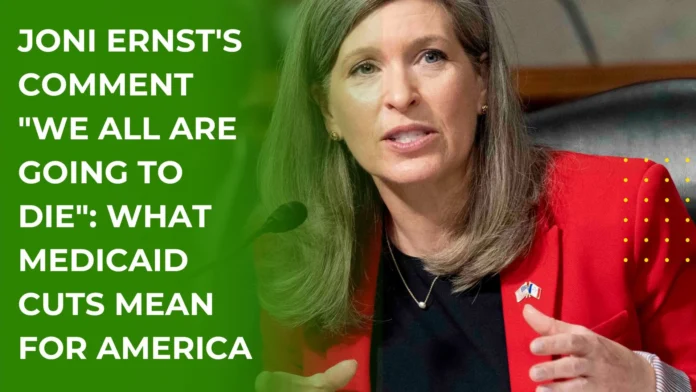Key Takeaways
- Senator Joni Ernst’s comment at an Iowa town hall have sparked national debate about the human cost of Medicaid cuts.
- Proposed Republican reforms could introduce stricter eligibility, work requirements, and reduce federal oversight, potentially impacting millions of Americans.
- Analysis and historical data suggest that similar policies have previously resulted in significant loss of coverage.
- The issue reflects broader tensions over healthcare access, fiscal responsibility, and the political stakes for both parties.
Joni Ernst Medicaid Cuts: A Town Hall Flashpoint Ignites National Debate
It was supposed to be a routine town hall in Parkersburg, Iowa—a chance for constituents to voice concerns and for Senator Joni Ernst to defend her party’s latest legislative agenda. Instead, what unfolded was a moment that ricocheted across headlines and social media: as the conversation turned tense over proposed Medicaid cuts, Ernst uttered, “We all are going to die,” a remark that drew immediate shouts and groans from the crowd.
The phrase, intended to deflect claims that people would die without Medicaid coverage, instead became a rallying cry for critics and a flashpoint in the ongoing debate over the future of America’s healthcare safety net.
A Moment of Raw Honesty—or Political Tone-Deafness?
In response to a distraught constituent’s warning that “people will die without coverage,” Senator Ernst made the remark. Her response, “Well, for heaven’s sakes, we’re all going to die,” was greeted with incredulity and annoyance. For many in the room, and for millions watching online, it crystallized fears that the proposed Medicaid cuts would have life-or-death consequences.
But Ernst didn’t back down. She argued that the $700 billion in spending reductions would target those “who should not qualify for it in the first place,” such as undocumented immigrants and people with employer-based insurance. “Those who meet the eligibility criteria for Medicaid will be safeguarded,” she insisted, trying to reassure the most vulnerable.
What’s Really in the Proposed Medicaid Cuts?
The Republican-backed House bill, dubbed “the big, beautiful bill,” narrowly passed and is now under Senate review. Its key Medicaid provisions include:
- Stricter Eligibility Verification: Enhanced checks to ensure only those who meet original Medicaid criteria remain on the rolls.
- Work Requirements: Able-bodied adults without dependents would need to complete a set number of work, volunteer, or educational hours to qualify.
- Reduced Federal Oversight: States would gain more authority to set eligibility, adjust benefits, and manage the program with less federal intervention.
These changes echo policies from the previous administration, which saw thousands lose coverage in states where work requirements were briefly enforced.
The Human Impact: Who Stands to Lose Coverage?
Early estimates suggest that if these changes become law, millions of people could lose healthcare coverage over the next decade. Historical precedent from work requirement experiments saw thousands of beneficiaries lose coverage in just a few months.
Senator Ernst and Republican leaders argue that the reforms will “sustain the program for vulnerable populations” by rooting out fraud and focusing resources on those most in need. But opponents and healthcare advocates warn that the real-world effect will be millions of Americans—many of them working-class or disabled—losing access to essential care.
Real Stories: What Medicaid Means to Iowans
For many in Iowa and across the country, Medicaid isn’t just a government program—it’s a lifeline. Take the story of Mary, a single mother from Waterloo, who credits Medicaid with covering her son’s cancer treatments. “Without Medicaid, we would have lost everything,” she says. Stories like Mary’s explain why even the suggestion of cuts evokes such passionate reactions at town halls.
Medicaid covers millions of Americans, including children, seniors, and people with disabilities. Any major eligibility changes will reverberate through hospitals, clinics, and families nationwide.
Political Stakes: Why This Fight Matters
Joni Ernst is up for reelection in 2026, and her comments have already become ammunition for Democratic opponents. “Joni Ernst said the quiet part out loud: Republicans do not care about whether their own constituents live or die as long as the richest few get richer,” charged one prominent party leader.
The debate also exposes deep philosophical divides: Should government prioritize fiscal discipline, or guarantee healthcare as a right? Is Medicaid a safety net for the vulnerable, or has it grown too large and unsustainable?
Analysis: What History Tells Us
Healthcare policy experts warn that work requirements and stricter eligibility checks often lead to confusion, administrative hurdles, and coverage losses for people who do qualify but struggle to navigate the bureaucracy. Past experiments found that many lost coverage not because they were ineligible, but because they missed paperwork deadlines or didn’t understand the new rules.
Meanwhile, shifting more control to states could create a patchwork of Medicaid programs, with access and benefits varying widely depending on where you live.
What Happens Next?
As the Senate examines the House bill, everyone is watching closely for possible amendments and ongoing debates. Ernst herself has acknowledged that the Senate’s version will likely differ from the House’s, suggesting room for compromise.
Healthcare providers, advocacy groups, and ordinary Americans are mobilizing—testifying before lawmakers, sharing personal stories, and urging elected officials to consider the real-world consequences of policy decisions.
How Should Americans Respond?
If you or a loved one relies on Medicaid, now is the time to stay informed and engaged. Connect with advocacy groups, tell your personal story, and reach out to your elected officials to make sure your perspective counts. For those seeking more information, look for nonpartisan analysis and updates on Medicaid policy from reputable sources.
Conclusion
Senator Joni Ernst’s “we all are going to die” remark may have been intended as a rhetorical flourish, but it has become a symbol of the high stakes in America’s healthcare debate. As Congress weighs sweeping changes to Medicaid, the question isn’t just about budgets and eligibility—it’s about the values we hold as a nation, and the lives that hang in the balance.


